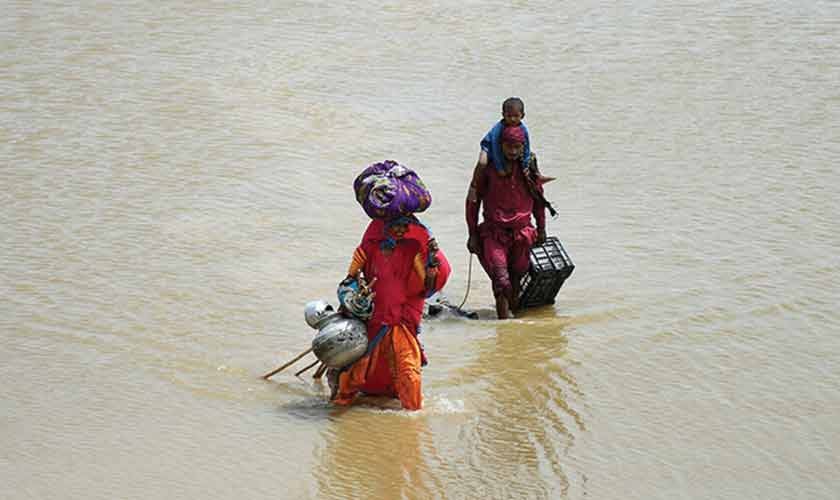**The Unseen Wounds of the 2022 Pakistan Floods: A Mental Health Perspective**
The monsoon of 2022 brought torrential rains across Pakistan. Although the Meteorological Department had warned about possible flooding, reality set in sooner than expected. Many areas of the country were submerged, and Sindh was no exception.
At that time, I had just assumed charge as the dean of the Faculty of Medicine at my university. The vice chancellor called an emergency meeting to discuss how we could contribute to relief efforts for communities in the flood-affected areas. Teams comprising doctors and paramedics were dispatched to provide first aid, food, medicines, and treatment for medical conditions commonly seen in such disasters, such as skin and eye infections.
As a mental health professional, I foresaw that physical healthcare alone would not be enough. Acute panic and deep psychological scars often accompany such calamities. So, after brief training on psychological first aid, I sent medical officers, psychiatry trainees, and psychology interns to join the medical teams on site.
This team worked effectively at the flood-hit locations, but many patients were later referred to hospitals in Hyderabad for ongoing treatment. I had the opportunity to meet several of these individuals. Among them was an old, lean man I will never forget.
He was quiet, tears streaming down his blank face, struggling to express the thoughts and emotions overwhelming him. A companion shared that he had lost the dowry he had painstakingly saved for his daughter’s marriage in the flood. Without saying a word, his grieving face and eyes spoke volumes—the dreams washed away, his spirit broken.
I also recall a mother who screamed every time she remembered her child drowning, and a farmer who lost his cattle, his livelihood decimated. Behind every individual case lay a story of human pain and sheer helplessness.
The floods had not only dismantled houses and damaged crops but also swept away the hopes and peace of countless people.
The psychological challenges didn’t end there. In a few weeks, even those who had helped flood survivors began experiencing anxiety, sleep disturbances, and trauma. During and after those difficult days, my team and I encountered the many dimensions of grief.
Many survivors initially experienced shock. They felt numb and struggled to comprehend what had happened. Those who had helped others lived with an intense fear of losing loved ones and belongings or facing hunger, disease, and another disaster.
There was overwhelming grief for those who had lost family members, relatives, homes, and lifelong savings. As people tried to rebuild their lives amidst instability and insecurity, some struggled with panic, anxiety, and sleeplessness.
Some developed post-traumatic stress disorder (PTSD), reliving traumatic events through flashbacks and nightmares. Others wrestled with suicidal thoughts fueled by survivor guilt.
Imagine a white-collar worker who once lived with dignity, now standing in a queue for food—his pride shattered, his spirit broken.
Children accompanying families of psychiatric patients often displayed withdrawn and fearful behavior, reflecting anxiety and confusion about their surroundings. Adults exhibited irritability, helplessness, and emotional numbness. The elderly, already fragile, lost their sense of safety and belonging.
Deep psychological scars linger far longer than physical damage, even after buildings are repaired and crops regrow.
Recognizing and treating emotional wounds is as vital as addressing physical health challenges in disasters. Recovery goes beyond rebuilding homes and providing food; it means restoring resilience, dignity, self-esteem, and hope to those who have suffered.
If psychological wounds remain unaddressed, healing stays incomplete. Fear, grief, despair, and shattered ego impede recovery despite adequate physical healthcare. Emotional scars erode motivation, disrupt sleep patterns, and weaken the body’s resilience.
This reality pains me deeply because public attention—and media coverage—tend to focus far more on physical health and infrastructure than on mental well-being.
The 2022 floods left us questioning: can we not learn this crucial lesson? Can we train ourselves to help those in distress practically? Rather than standing by as bystanders, filming videos, or panicking, can we act with empathy—listening, connecting, and comforting those who have suffered and offering them a ray of hope?
Can our governments support these distressed people in a dignified way that protects their self-esteem? Doing so would enable survivors to become more resilient, capable of rebuilding their own lives, and perhaps even helping others in turn.
**The true recovery lies not only in restoring what was lost physically but also in healing the unseen wounds of the mind and heart.**
https://www.thenews.com.pk/tns/detail/1350034-floods-washed-away-all-but-tears


